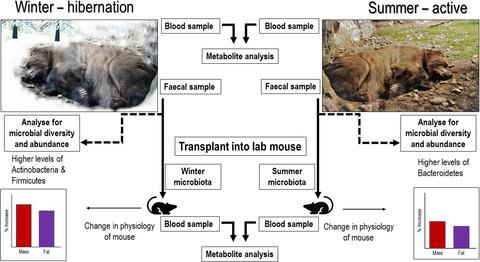当前位置:
X-MOL 学术
›
J. Anim. Ecol.
›
论文详情
Our official English website, www.x-mol.net, welcomes your
feedback! (Note: you will need to create a separate account there.)
The potential role of the gut microbiota in shaping host energetics and metabolic rate
Journal of Animal Ecology ( IF 3.5 ) Pub Date : 2020-09-28 , DOI: 10.1111/1365-2656.13327 Elle C Lindsay 1 , Neil B Metcalfe 1 , Martin S Llewellyn 1
Journal of Animal Ecology ( IF 3.5 ) Pub Date : 2020-09-28 , DOI: 10.1111/1365-2656.13327 Elle C Lindsay 1 , Neil B Metcalfe 1 , Martin S Llewellyn 1
Affiliation

|
It is increasingly recognised that symbiotic microbiota (especially those present in the gut) have important influences on the functioning of their host. Here we review the interplay between this microbial community and the growth, metabolic rate and nutritional energy harvest of the host. We show how recent developments in experimental and analytical methods have allowed much easier characterisation of the nature, and increasingly the functioning, of the gut microbiota. Manipulation studies that remove or augment gut microorganisms or transfer them between hosts have allowed unprecedented insights into their impact. While much of the information to date has come from studies of laboratory model organisms, recent studies have used a more diverse range of host species, including those living in natural conditions, revealing their ecological relevance. The gut microbiota can provide the host with dietary nutrients that would be otherwise unobtainable, as well as allow the host flexibility in its capacity to cope with changing environments. The composition of the gut microbial community of a species can vary seasonally or when the host moves between environments (e.g. fresh and sea water in the case of migratory fish). It can also change with host diet choice, metabolic rate (or demands) and life stage. These changes in gut microbial community composition enable the host to live within different environments, adapt to seasonal changes in diet and maintain performance throughout its entire life history, highlighting the ecological relevance of the gut microbiota. While it is evident that gut microbes can underpin host metabolic plasticity, the causal nature of associations between particular microorganisms and host performance is not always clear unless a manipulative approach has been used. Many studies have focussed on a correlative approach by characterising microbial community composition, but there is now a need for more experimental studies in both wild and laboratory-based environments, to reveal the true role of gut microbiota in influencing the functioning of their hosts, including its capacity to tolerate environmental change. We highlight areas where these would be particularly fruitful in the context of ecological energetics.
中文翻译:

肠道微生物群在塑造宿主能量和代谢率方面的潜在作用
人们越来越认识到共生微生物群(尤其是存在于肠道中的微生物群)对其宿主的功能具有重要影响。在这里,我们回顾了该微生物群落与宿主的生长、代谢率和营养能量收获之间的相互作用。我们展示了实验和分析方法的最新发展如何使肠道微生物群的性质和功能的表征变得更加容易。去除或增加肠道微生物或在宿主之间转移它们的操作研究使得对其影响有了前所未有的了解。虽然迄今为止的大部分信息来自对实验室模式生物的研究,但最近的研究使用了更多样化的宿主物种,包括生活在自然条件下的宿主物种,揭示它们的生态相关性。肠道微生物群可以为宿主提供其他方式无法获得的膳食营养,并允许宿主灵活应对不断变化的环境。一个物种的肠道微生物群落的组成可能会随季节或宿主在环境之间移动(例如洄游鱼类的淡水和海水)而变化。它还可以随着宿主饮食选择、代谢率(或需求)和生命阶段而改变。肠道微生物群落组成的这些变化使宿主能够生活在不同的环境中,适应饮食的季节性变化并在其整个生命历史中保持性能,突出了肠道微生物群的生态相关性。虽然很明显肠道微生物可以支持宿主代谢可塑性,除非使用了操纵方法,否则特定微生物与宿主性能之间关联的因果性质并不总是很清楚。许多研究侧重于通过表征微生物群落组成的相关方法,但现在需要在野生和实验室环境中进行更多的实验研究,以揭示肠道微生物群在影响宿主功能方面的真正作用,包括其承受环境变化的能力。我们强调了这些在生态能量学背景下特别富有成效的领域。但是现在需要在野生环境和实验室环境中进行更多的实验研究,以揭示肠道微生物群在影响宿主功能方面的真正作用,包括其耐受环境变化的能力。我们强调了这些在生态能量学背景下特别富有成效的领域。但是现在需要在野生环境和实验室环境中进行更多的实验研究,以揭示肠道微生物群在影响宿主功能方面的真正作用,包括其耐受环境变化的能力。我们强调了这些在生态能量学背景下特别富有成效的领域。
更新日期:2020-09-28
中文翻译:

肠道微生物群在塑造宿主能量和代谢率方面的潜在作用
人们越来越认识到共生微生物群(尤其是存在于肠道中的微生物群)对其宿主的功能具有重要影响。在这里,我们回顾了该微生物群落与宿主的生长、代谢率和营养能量收获之间的相互作用。我们展示了实验和分析方法的最新发展如何使肠道微生物群的性质和功能的表征变得更加容易。去除或增加肠道微生物或在宿主之间转移它们的操作研究使得对其影响有了前所未有的了解。虽然迄今为止的大部分信息来自对实验室模式生物的研究,但最近的研究使用了更多样化的宿主物种,包括生活在自然条件下的宿主物种,揭示它们的生态相关性。肠道微生物群可以为宿主提供其他方式无法获得的膳食营养,并允许宿主灵活应对不断变化的环境。一个物种的肠道微生物群落的组成可能会随季节或宿主在环境之间移动(例如洄游鱼类的淡水和海水)而变化。它还可以随着宿主饮食选择、代谢率(或需求)和生命阶段而改变。肠道微生物群落组成的这些变化使宿主能够生活在不同的环境中,适应饮食的季节性变化并在其整个生命历史中保持性能,突出了肠道微生物群的生态相关性。虽然很明显肠道微生物可以支持宿主代谢可塑性,除非使用了操纵方法,否则特定微生物与宿主性能之间关联的因果性质并不总是很清楚。许多研究侧重于通过表征微生物群落组成的相关方法,但现在需要在野生和实验室环境中进行更多的实验研究,以揭示肠道微生物群在影响宿主功能方面的真正作用,包括其承受环境变化的能力。我们强调了这些在生态能量学背景下特别富有成效的领域。但是现在需要在野生环境和实验室环境中进行更多的实验研究,以揭示肠道微生物群在影响宿主功能方面的真正作用,包括其耐受环境变化的能力。我们强调了这些在生态能量学背景下特别富有成效的领域。但是现在需要在野生环境和实验室环境中进行更多的实验研究,以揭示肠道微生物群在影响宿主功能方面的真正作用,包括其耐受环境变化的能力。我们强调了这些在生态能量学背景下特别富有成效的领域。











































 京公网安备 11010802027423号
京公网安备 11010802027423号